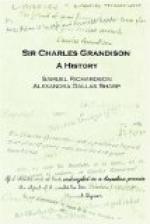This, sir, is the case. Let it, I beseech you, rest within your own breast, and my brother Fowler’s. How few minds are there delicate and candid enough to see circumstances of this kind in the light they ought to appear in! And pray for me, my good Sir Rowland; not that the way may be smoothed to what once would have crowned my wishes as to this life; but that Sir Charles Grandison may be happy with the lady that is, and ought to be, dearest to his heart; and that your daughter may be enabled to rejoice in their felicity. What, my good sir, is this span of life, that a passenger through it should seek to overturn the interests of others to establish her own? And can the single life be a grievance? Can it be destitute of the noblest tendernesses? No, sir. You that have lived to an advanced age, in a fair fame, surrounded with comforts, and as tender to a worthy nephew, as the most indulgent father could be to the worthiest of sons, can testify for me, that it is not.
But now, sir, one word—I disclaim, but yet in all thankfulness, the acceptance of the favour signified to be intended me in the latter part of the paternal letter before me. Our acquaintance began with a hope, on your side, that I could not encourage. As I could not, shall I accept of the benefit from you, to which I could only have been entitled (and that as I had behaved) had I been able to oblige you?—No, sir! I will not, in this case, be benefited, when I cannot benefit. Put me not therefore, I beseech you, sir, if such an event (deplored by me, as it would be!) should happen, upon the necessity of inquiring after your other relations and friends. Sir Rowland Meredith my father, and Mr. Fowler my brother, are all to me of the family they distinguish by their relation, that I know at present. Let me not be made known to the rest by a distinction that would be unjust to them, and to yourself, as it must deprive you of the grace of obliging those who have more than a stranger’s claim; and must, in the event, lay them under the appearance of an obligation to that stranger for doing them common justice.
I use the word stranger with reference to those of your family and friends to whom I must really appear in that light. But, laying these considerations aside, in which I am determined not to interfere with them, I am, with the tenderest regard, dear and good sir,
Your ever-dutiful and affectionate daughter,
Harriet Byron.
LETTER XXXV
MISS BYRON, TO MISS SELBY WEDNESDAY, APRIL 19.
I shall dispatch this by your Gibson early in the morning. It was kind in you to bid him call, in his way down; for now I shall be almost sure of meeting (if not my uncle) your brother, and who knows, but my Lucy herself, at Dunstable? Where, barring accidents, I shall be on Friday night.
You will see some of the worthiest people in the world, my dear, if you come, all prepared to love you: but let not any body be put to inconvenience to meet me at Dunstable. My noble friends here will proceed with me to Stratford, or even to Northampton, they say; but they will see me safe in the protection of somebody I love, and whom they must love for my sake.




